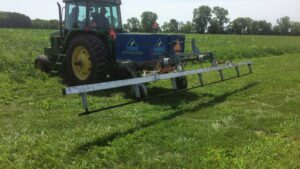Canada is taking the right approach to managing this valuable technology.
According to two scientists who have spent years researching glyphosate resistance, Canada is setting an example for proper management of this weed technology. In a recent report titled “Glyphosate-Resistant Crops and Weeds: Now and in the Future” published in the journal AgBioForum, Stephen Powles from the University of Western Australia and Stephen Duke from the U.S. Department of Agriculture’s Agricultural Research Service examine the pitfalls of glyphosate resistance while singling out Canada
as a country that is effectively managing this technology.
The report states that overuse of this single weed management technology is jeopardizing it as an effective tool due to the emergence of new weed species that are only poorly controlled by glyphosate and the evolution of glyphosate-resistant weeds.
According to the authors, the problem is that there has been a massive increase in the use of glyphosate-resistant crops in the United States, Argentina and Brazil, reducing herbicide diversity. “This is starkly evident for soybean production in the United States,” says the report. “As GR soybeans and glyphosate were adopted, other herbicides largely disappeared from most fields, minimizing herbicide diversity in U.S. soybean fields. It is well known that herbicide resistance evolution will be fastest where diversity is minimal. There can be no better example of this lack of diversity in weed control than multiple applications of glyphosate on the same field every year in GR crops.”
Canada’s Approach
The authors point out that Canada is taking the right approach to glyphosate resistance. By rotating crops and promoting diversity by choosing varieties with resistance to other herbicides such as glufosinate, Canada is setting a positive example.
“Unsurprisingly, there are currently no known cases of evolved GR weeds in Canada,” says the report. “This is undoubtedly due to the diversity, as it refers to glyphosate, evident in the non- GR crop cereal/GR canola Canadian cropping system, relative to that in the GR soybean/maize/cotton agroecosystems to the south. Thus, GR canola should remain sustainable in Canada if this diversity is maintained. There are important lessons that other parts of the world can learn in this sustainable use of GR crops in Canada.”
Maintaining Resistance
However, the Canadian industry cannot afford to get too confident just yet. Earlier this spring, after the report was published, the first case of a GR weed in Canada was confirmed. University of Guelph weed scientists have completed evaluations of a giant ragweed population in Ontario and can now confirm the first case of a GR weed in Canada.
“We have been able to demonstrate that plants from this population of giant ragweed meet all five requirements necessary to confirm resistance, including surviving increased rates of glyphosate and the ability to pass resistance along to the next generation,” says François Tardif of the Department of Plant Agriculture at the University of Guelph.
The population in question underwent both greenhouse and field testing by university researchers, working in conjunction with Monsanto Canada, in order to confirm resistance. While over 30 other species of weeds in Canada have developed resistance to herbicides, this is the first confirmation of a GR weed in Canada. In other countries around the world, 17 weed species—including giant ragweed—have been confirmed as resistant to glyphosate. Ten of those species are in the United States.
As part of an ongoing collaborative research effort between the University of Guelph and Monsanto, other giant ragweed populations in southwestern Ontario are also being tested for susceptibility to glyphosate. Results from these tests will help determine the scope of the issue and any need to adjust weed management strategies and recommendations.
Diversification
So what can be done to make glyphosate use sustainable? “A major lesson evident from more than three decades of glyphosate use worldwide is that, where diversity in weed management systems is maintained, weed control by glyphosate can be sustainable,” says the report. “It is clear that, where there is very intense glyphosate selection without diversity, GR weed populations will evolve. In particular, the evolution of GR weed populations is a looming threat in areas where transgenic GR crops dominate the landscape and in which glyphosate selection is intense and without diversity. If current practices continue in these areas, GR weeds will become a major problem.”
Therefore, the report concludes that the United States, Argentina and Brazil need to follow Canada’s lead and introduce diversity in the GR crop areas. “What specifically constitutes ‘diversity’ will vary according to region, ecosystem, enterprises, economics and many other factors. However, diversity will involve herbicide rotations,sequences, combinations of robust rates of different modes
of action and use of non-herbicide weed-control tools. Such diversity must be introduced now in the GR crop areas of the United States, Argentina, and Brazil. Mixtures of glyphosate with effective doses of soil-residual herbicides are already being adopted, and transgenic crops with additional herbicide resistance genes are in development,” the report says. “Alternative herbicides and integration with non-herbicidal weed-control tools will be required.”
While Canada is certainly an example to follow when it comes to proper management of GR crops, the recent appearance of a GR population in Ontario is an important reminder for seed companies to help growers consider diversity in their weed management strategies and crop management practices.
Peter Sikkema, a plant agriculture professor at the University of Guelph’s Ridgetown campus, says this means advising growers to include diversity in their cropping systems, including a diverse crop rotation with multiple herbicide modes of action over time. Growers are advised to use appropriate rates and other herbicides in their program where possible, including existing residual herbicides, to reduce the likelihood of glyphosate resistance developing in their fields.
By not relying solely on glyphosate and maintaining some diversity in weed-management techniques, Canada is taking the right approach to ensuring the longevity of glyphosate and its use for future harvests. Julie McNabb










